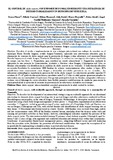Mostrar el registro sencillo del ítem
El control de Aedes aegypti, con enfoque de ecosalud mediante una estrategia de intersectorialidad en un municipio de Venezuela
| dc.rights.license | http://creativecommons.org/licenses/by-nc-sa/3.0/ve/ | es_VE |
| dc.contributor.author | Flores, Karen | |
| dc.contributor.author | Guevara de Sequeda, Milady | |
| dc.contributor.author | Mazzarri, Milena | |
| dc.contributor.author | Rattia, Julia | |
| dc.contributor.author | Marruffo, Marco | |
| dc.contributor.author | Alcalá, Pedro | |
| dc.contributor.author | Castillo, Ángel | |
| dc.contributor.author | Guerrero, Heldomira | |
| dc.contributor.author | Cornieles, Ricardo | |
| dc.date.accessioned | 2019-07-04T15:02:53Z | |
| dc.date.available | 2019-07-04T15:02:53Z | |
| dc.date.issued | 2019-07-04 | |
| dc.identifier.issn | 0798-3166 | |
| dc.identifier.uri | http://www.saber.ula.ve/handle/123456789/45898 | |
| dc.description.abstract | Objetivo: Describir el diseño e implementación de una estrategia intersectorial con enfoque de ecosalud en el municipio Mario Briceño Iragorry, estado Aragua-Venezuela, aplicando una intervención educativa para la eliminación de criaderos de Aedes aegypti para la prevención de dengue y otras arbovirosis en el municipio Mario Briceño Iragorry en el estado Aragua, Venezuela. Metodología: Se realizó una investigación descriptiva, con diseño de campo, con tres fases: 1. Preparatoria, para constituir un comité intersectorial. 2. Diagnóstico, mediante la aplicación de una encuesta de Conocimientos, Aptitudes y Prácticas sobre Dengue, Chikungunya and Zika, en familias seleccionadas y la identificación de criaderos de Aedes aegypti en sus viviendas. 3. Iintervención educativa en escuelas. Resultados: Se encuestaron 2000 familias de estratos socioeconómicos altos, medios y bajos; 80% manifestaron tener conocimiento sobre dengue y desarrollar actividades preventivas en sus viviendas; los indicadores entomológicos reportaron la presencia del vector Aedes aegypti. La intervención permitió capacitar 95 escolares de 3º a 6º grado de educación básica, con edades entre 9 y 12 años de edad quienes generaron jornadas de intercambio con sus comunidades. Conclusiones: Una gestión participativa desde las familias, integrando a diferentes sectores, con el liderazgo del sector educativo, hace factible promover modificaciones de conductas para asumir la corresponsabilidad de ejecución de acciones de prevención de las arbovirosis sostenibles en el tiempo. | es_VE |
| dc.language.iso | es | es_VE |
| dc.publisher | SaberULA | es_VE |
| dc.rights | info:eu-repo/semantics/openAccess | es_VE |
| dc.subject | Aedes aegypti | es_VE |
| dc.subject | Intersectorialidad | es_VE |
| dc.subject | Ecosalud | es_VE |
| dc.subject | Promoción de la salud | es_VE |
| dc.subject | Control de vectores. | es_VE |
| dc.title | El control de Aedes aegypti, con enfoque de ecosalud mediante una estrategia de intersectorialidad en un municipio de Venezuela | es_VE |
| dc.title.alternative | Control of Aedes aegypti, with ecohealth approach, through an intersectorial strategy in a municipality of Venezuela. | es_VE |
| dc.type | info:eu-repo/semantics/article | es_VE |
| dcterms.dateAccepted | 20 marzo 2019 | |
| dcterms.dateSubmitted | 19 febrero 2019 | |
| dc.description.abstract1 | Objective: To describe the development of an intersectoral strategy using an ecohealth approach for an educational intervention to eliminate Aedes aegypti breeding sites to prevent dengue and other arbovirosis, conducted in Mario Briceño Iragorry municipality, in the state of Aragua, Venezuela. Methodology: A descriptive research project was carried out, using a field study design and organized in three phases: 1. Preparatory, organization of an intersectoral committee. 2. Diagnostic, including georeferencing of sectors, application of a Knowledge, Skills and Practices survey on Dengue, Chikungunya and Zika, with selected families and identification of Aedes aegypti breeding sites in their homes. 3. Educational intervention based in schools. Results: 2000 families were surveyed from high, middle and low socioeconomic strata; 80% of the families reported having knowledge about the diseases under study and carrying out preventive activities in their homes; however, entomological indicators reported the presence of the Aedes aegypti vector. The intervention included training 95 primary school students in grades 3 through 6, aged between 9 and 12 years of age, who organized and conducted education and outreach days within their communities. Conclusions: A participatory family-based management process, integrating different sectors and with leadership from the education sector, facilitates the promotion of behavioral modifications that support the assumption of co- responsibility for implementing sustainable actions to prevent arboviral diseases. | es_VE |
| dc.description.colacion | 20-28 | es_VE |
| dc.description.email | miladymguevarap@hotmail.com. | es_VE |
| dc.description.email | mazzarri.milena@gmail.com | es_VE |
| dc.description.email | marcomarruffo@gmail.com | es_VE |
| dc.description.email | angel_castillo.r@hotmail.com | es_VE |
| dc.description.email | helda68@hotmail.com | es_VE |
| dc.description.email | rcornieles@hotmail.com | es_VE |
| dc.description.email | floresk@hotmail.com | es_VE |
| dc.description.frecuencia | Semestral | |
| dc.description.paginaweb | http://www.saber.ula.ve/medula/ | |
| dc.identifier.depositolegal | pp 19910ME310 | |
| dc.identifier.edepositolegal | ppi 201202ME4101 | |
| dc.identifier.eissn | 2244-8829 | |
| dc.subject.facultad | Facultad de Medicina | es_VE |
| dc.subject.institucion | Universidad de Los Andes | es_VE |
| dc.subject.keywords | Aedes aegypti | es_VE |
| dc.subject.keywords | Intersectoral | es_VE |
| dc.subject.keywords | Ecohealth | es_VE |
| dc.subject.keywords | Health promotion | es_VE |
| dc.subject.keywords | Vector control | es_VE |
| dc.subject.seccion | Revista MedULA: Artículo | es_VE |
| dc.subject.thematiccategory | Medicina y Salud | es_VE |
| dc.subject.tipo | Revistas | es_VE |
| dc.type.media | Texto | es_VE |
Ficheros en el ítem
Este ítem aparece en la(s) siguiente(s) colección(ones)
-
MedULA - Vol. 028, Nº 1
enero-junio 2019


